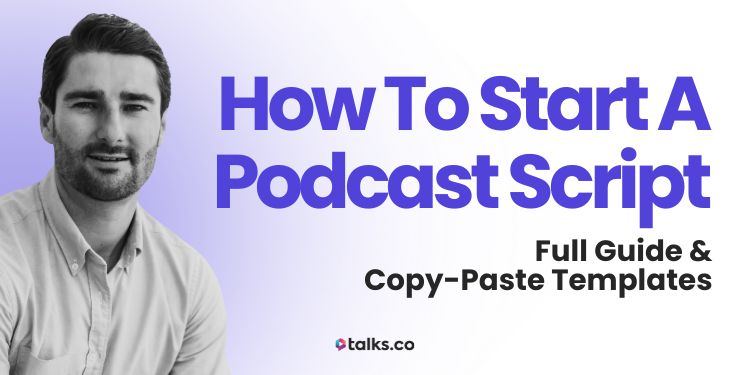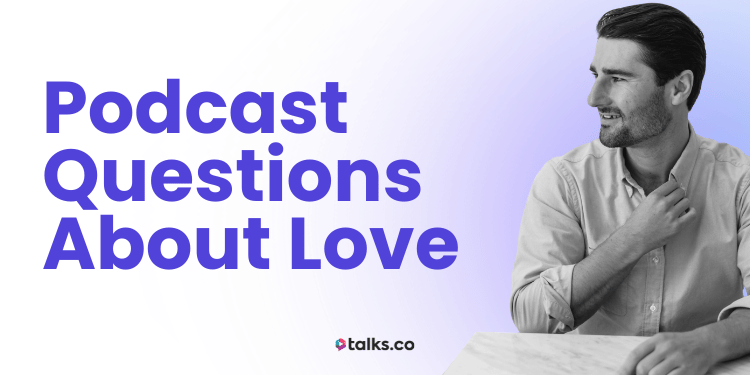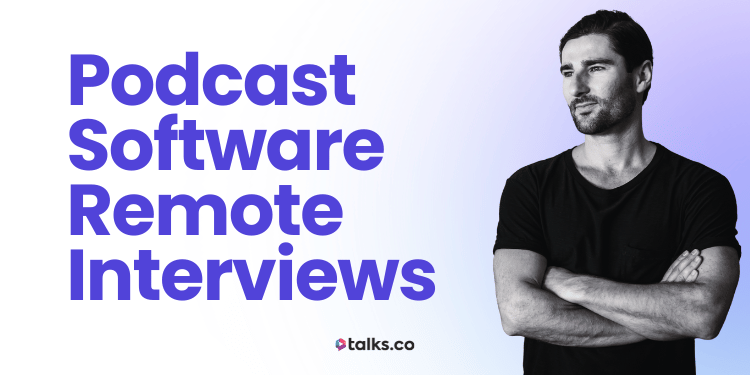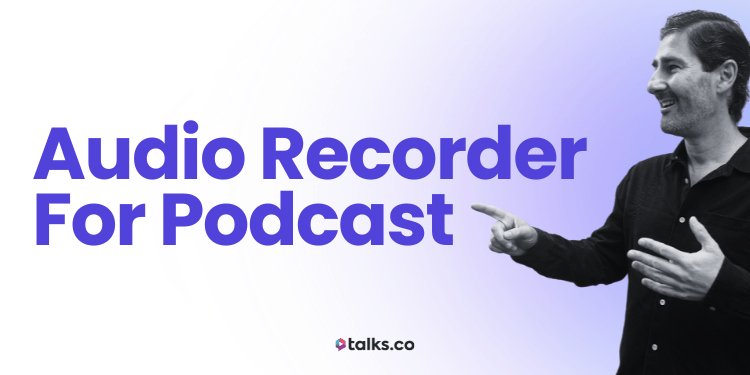So you’ve got a podcast idea, a mic, maybe even a show name scribbled in your notes app… but when it comes to actually starting your podcast outline, your brain goes blank.
What do you say first? How do you keep people listening past the first 10 seconds? And how the heck do you not sound like you’re reading a word-for-word script?
You’re not alone. I’ve worked with hundreds of experts who are brilliant at what they do… but freeze up when it’s time to write a podcast intro for their own show. Totally normal. Most podcasting hosts aren’t born scriptwriters. I definitely wasn’t either.
The good news? You don’t need to be a writer to figure out how to start a podcast script.
You just need a bit of structure, some real examples, and a few podcast format tips from someone who’s been around the mic a few hundred times. That’s what you’ll find here.
In this guide, I’ll walk you through how to start a podcast script, especially if writing isn’t your thing. I’ll show you what works, what doesn’t, and how to make the whole process feel less like homework and more like having a great chat.
I’ll also share a few free templates and tips to create a podcast script and introduce you to the script generator I built over at Talks. It’s helped a ton of podcasters create the perfect podcast intro faster and sound more like themselves on air.
Let’s make this easy for you as a podcast host. You’ve got something valuable to share on your podcast show. Now, let’s help you say it in a way that lands.
What Is a Podcast Script?

A podcast script is your game plan. It’s not a word-for-word readout (unless you want it to be), but more like a guide that helps you stay on track and hit your key points without rambling or repeating yourself.
Think of it like how a coach runs drills before a match; not because the players don’t know how to play, but to keep things tight when it counts. Same goes here. Your script helps you sound natural and stay focused, especially when you’re recording solo or running a tight interview.
There’s no one way to write a script either. Some hosts use bullet points. Others write a full podcast intro script and keep the rest of the podcast transcript casual.
The goal isn’t to sound robotic during your podcast recording. It’s to give your new podcast ideas some shape, so your listeners stick around.
How To Start a Podcast Script for Beginners
Writing a script for your podcast doesn’t mean sounding stiff. It’s just a way to keep things on track so you’re not rambling, losing your point, or sitting in awkward silence.
And you don’t need to be a great writer to sound confident and clear behind the mic. You just need a bit of structure when writing your podcast intro script.
How to start off a podcast script

Your opening is everything. You’ve got about 10 seconds (or even less) to hook someone in.
Here’s a good podcast intro formula for a well-written script that works:
- Quick hook: Lead with something bold, surprising, or super relevant.
- Who you are: Short and sweet. One line.
- What the episode is about: Give them a great podcast topic and what they’ll walk away with.
- Why it matters now: Tie it to something they’re thinking or feeling today.
Example: “Most people quit their podcast before episode ten. Today I’ll show you how to avoid that. I’m Liam from Talks, and if you’ve ever hit record and thought, ‘Where do I even start?’, this one’s for you. We’re talking simple scripting that keeps you on track and makes everything feel easier.”
How to write a podcast script
Once your episode ideas are mapped out, now it’s time to write the great podcast script you’ll actually use while recording.
Here’s how to turn your outline into something solid:
- Set up your script layout. Use headers for intro, body, and outro. Break the body into podcast segments based on your key points. You want it scannable, not overwhelming.
- Write the must-say parts word-for-word. This includes your hook, podcast introduction script, transitions, and call-to-action. These help set the tone and keep you on track.
- Use bullet points for talking segments. Instead of scripting every word when creating a script for your podcast content, use short bullets for the sections you’ll speak more freely in. This keeps your delivery natural.
- Add delivery cues. Include notes like “pause here,” “use an example,” or “slow down” to guide your pacing while reading a script.
- Read your script out loud once. Make sure it reads the way you talk. It should sound like you, not like you’re reading from a blog post.
How to make a podcast script
Making a podcast script is like planning out what you’d say to a friend over coffee… only with a bit more intention behind it. You’re not writing a novel. You’re just giving your ideas a place to land before you hit record.
Here’s how to build it from the ground up:
- Start with a brain dump. Open a doc or notebook and pour out every idea you want to cover. No editing. No structure. Just get your thoughts out.
- Group related ideas. Look for natural themes. Which stories go together? Which points build on each other? Start clustering them into loose sections.
- Choose a main message. What’s the one takeaway you want your listener to walk away with? Use that as your filter. Anything that doesn’t support it can go.
- Create a simple outline. Turn your clusters into a basic structure: intro, key sections, and outro. At this stage, you’re just sketching the flow.
- Mark standout ideas. Highlight stories, examples, or statistics you definitely want to include. These will help anchor your episode once you move into writing.
You don’t need to start polished to create a successful podcast. You just need to start. This process gives you a clear direction before you worry about wording. Think of it as building the map before you write the directions.
How to make a good podcast script
Want your script to actually work and keep people listening to every podcast? Here’s what helps:
- It flows well: Feels like a real conversation, not a list of facts.
- It pulls people in: Use openers like “Ever thought about…” or “Here’s something nobody tells you…”
- It’s focused: Cut anything that doesn’t serve the message.
- It sounds like you: Keep your natural tone, quirks, and way of speaking.
How to structure a podcast script
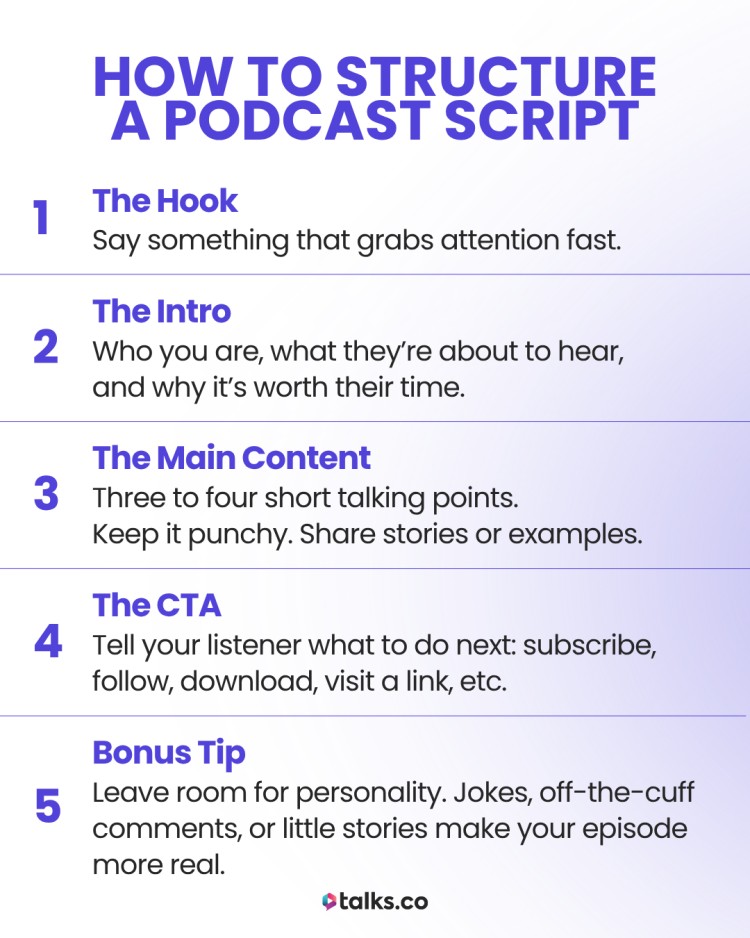
Structure helps you stay focused without sounding scripted.
Here’s an easy format:
- The hook. Say something that grabs attention fast.
- The intro. Who you are, what they’re about to hear, and why it’s worth their time.
- The main content. Three to four short talking points. Keep it punchy. Share stories or examples.
- The CTA. Tell your listener what to do next: subscribe, follow, download, visit a link, etc.
Bonus tip: Leave room for personality. Jokes, off-the-cuff comments, or little stories make your episode more real.
Why Is a Podcast Script Important?
Ever listened to a podcast where the host rambled for five minutes before getting to the point? A solid podcast script helps avoid that.
Here’s why it matters, especially if you’re learning how to record a podcast, grow an audience, or get featured on shows:
- You’ll sound more confident. When you know where you’re going, you’re less likely to freeze, repeat yourself, or go off on tangents. A script helps you stay calm and collected even if you’re nervous.
- It keeps your episodes tight. How long a podcast should be matters. A script helps you trim the fat and stick to what actually matters. You’ll save them time, and they’ll keep coming back.
- It makes editing way easier. You’ll avoid messy stops and starts when your thoughts are already mapped out. Your editor (or future self) will thank you.
- It helps you hit your CTA. Most people forget to actually say what they want their listeners to do next. A script makes sure you don’t skip the important stuff, like promoting your freebie or telling them where to find you.
- It boosts your authority. Sounding prepared builds trust. People can tell when you’ve put in the work and it makes them more likely to take action, share your episode, or invite you onto their show.
A good script helps you stay sharp, deliver value, and keep listeners engaged from the first second to the last. It shows you’ve put thought into what you’re saying and respect your listener’s time. That’s what makes a good podcast.
How To Plan a Podcast Script
Before you start writing, you’ve got to know what kind of episode you’re creating and who you’re talking to. Planning your script is what makes everything else flow.
Here’s how to plan it right:
- Choose your podcast episode type. Are you teaching something? Interviewing a guest? Sharing a story? The format shapes the script. For example, a solo episode needs a strong hook and clear talking points. An interview? You’ll want to prep smart questions and smooth transitions.
- Know your goal. Every episode should lead somewhere – a CTA, a mindset shift, or a conversation you want your audience to think about. Start with the end in mind, so your content naturally builds toward it.
- Outline the key points. Don’t wing it. Jot down the main takeaways you want to cover. Think of these like goalposts. They’ll keep you focused while you riff in your own style.
- Decide how you’ll open and close. Your intro is your first impression. Your outro is your last chance to get them to act. Plan them both. Even if the middle is a little messy, strong openings and closings give the whole thing more polish.
Script Podcast Example: Solo, Co-Hosted & Guest Interview
Alright, you’ve got the steps. Now let’s see what this actually looks like in real life. Below are three podcast script examples based on different formats and good podcast topics all created using the Talks podcast script generator.
Use them as a starting point to help you understand how to do a podcast interview, tweak the flow, and make it your own.
1. Solo episode script example
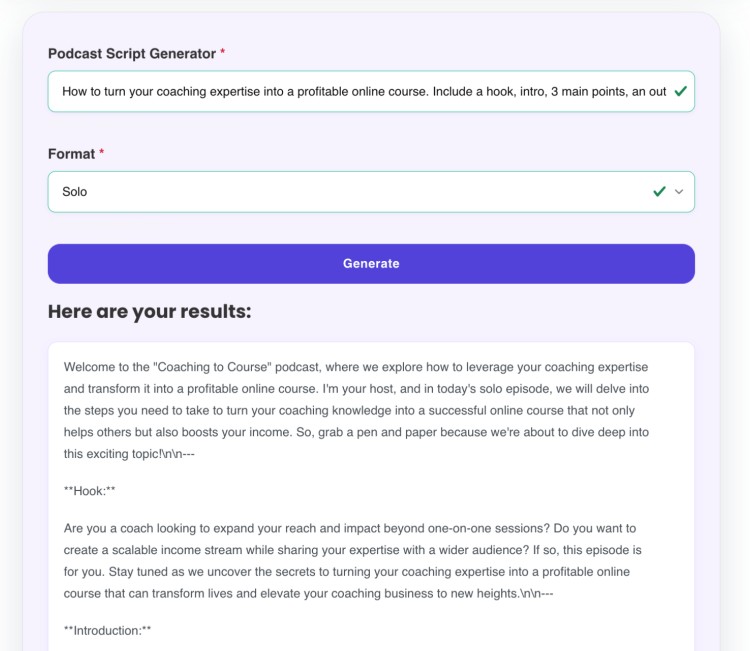
Topic: How to turn your coaching expertise into a profitable online course. Include a hook, intro, 3 main points, an outro, and a clear CTA.
Format: Solo
Welcome: Welcome to the “Coaching to Course” podcast, where we explore how to leverage your coaching expertise and transform it into a profitable online course. I’m your host, and in today’s solo episode, we’ll walk through the steps to turn your coaching knowledge into a course that helps others and boosts your income. Grab a pen and paper—we’re about to get into it.
Hook: Are you a coach looking to expand your reach beyond one-on-one sessions? Want to create a scalable income stream while sharing your expertise with more people? This episode is for you. We’re covering how to turn your coaching skills into a profitable online course that transforms lives and grows your business.
Introduction: As a coach, you’ve built up real-world experience that can help people grow. One-on-one coaching is powerful—but it’s also limited by your time and energy. An online course helps you scale that impact. You’ll reach more people, generate passive income, and position yourself as a go-to expert in your niche.
Main Points:
1. Identify your niche: What specific result or transformation do you help people achieve? Who are they, and what are they struggling with? A well-defined niche helps you speak directly to your ideal student and build a course that hits home.
2. Map your content: Break your process down into clear steps or phases. What do students need to understand first? What builds on that? Create a rough outline before you worry about recording anything.
3. Make your course engaging: Mix it up with videos, worksheets, short exercises, or even personal stories. Think: How can you keep students motivated and moving forward? Don’t just give information—guide them through a transformation.
Outro: Now you’ve got the basics: niche clarity, a content plan, and ways to make your course engaging. Your next step? Start. You don’t need it to be perfect—you just need it to be helpful, clear, and aligned with the results you already get in your coaching.
CTA: Want support creating your first (or next) course? Head over to our website for free tools, templates, and expert tips to help you build something that sells—and serves. Your knowledge is valuable. Let’s get it out into the world.
Closing: Thanks for tuning in to this episode of Coaching to Course. You’ve got what it takes to teach what you know and turn it into something that lives beyond the coaching call. Until next time—keep coaching, keep creating, and keep showing up.
2. Co-hosted episode script example
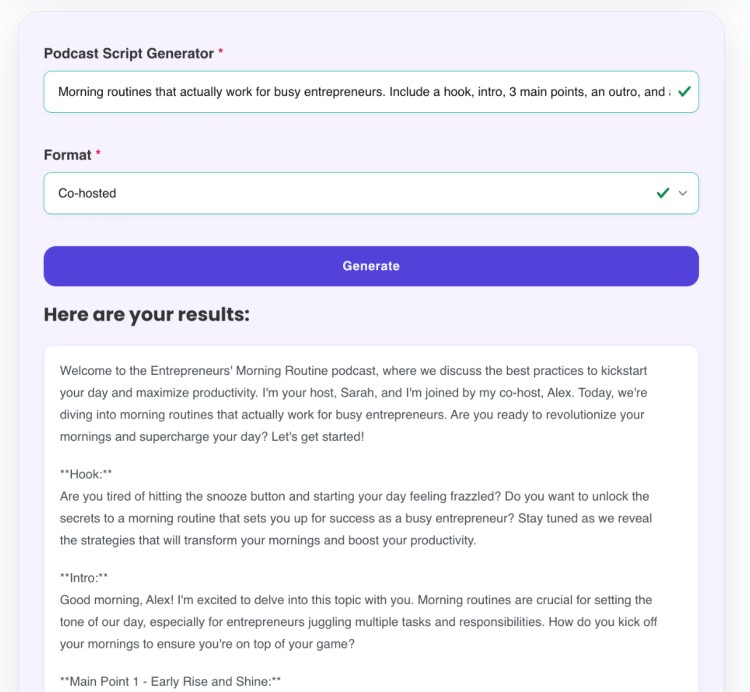
Topic: Morning routines that actually work for busy entrepreneurs. Include a hook, intro, 3 main points, an outro, and a clear CTA.
Format: Co-hosted
Welcome: Welcome to the Entrepreneurs’ Morning Routine podcast, where we discuss the best practices to kickstart your day and maximize productivity. I’m your host, Sarah, and I’m joined by my co-host, Alex. Today, we’re diving into morning routines that actually work for busy entrepreneurs. Are you ready to revolutionize your mornings and supercharge your day? Let’s get started!
Hook: Are you tired of hitting the snooze button and starting your day feeling frazzled? Do you want to unlock the secrets to a morning routine that sets you up for success as a busy entrepreneur? Stay tuned as we reveal the strategies that will transform your mornings and boost your productivity.
Introduction: Good morning, Alex! I’m excited to delve into this topic with you. Morning routines are crucial for setting the tone of our day, especially for entrepreneurs juggling multiple tasks and responsibilities. How do you kick off your mornings to ensure you’re on top of your game?
Main Points:
1. Early rise and shine: One of the key ingredients to a successful morning routine is waking up early. While it may seem challenging at first, early mornings offer a quiet and focused time to set intentions for the day. By rising before the rest of the world, entrepreneurs can carve out precious moments for themselves—whether it’s for meditation, exercise, or simply enjoying a cup of coffee in peace. Alex, how do you make the most of your early mornings?
2. Mindful movement and mindset: Incorporating mindful movement into your morning routine can have a profound impact on your productivity and well-being. Whether it’s a quick yoga session, a brisk walk, or a high-intensity workout, physical activity can boost your energy levels and mental clarity. Pairing this with a positive mindset through affirmations or visualization exercises can set the stage for a successful day ahead. Alex, how do you integrate movement and mindset practices into your mornings?
3. Strategic planning and prioritization: As entrepreneurs, our days are often filled with endless tasks and deadlines. A crucial aspect of an effective morning routine is taking the time to plan and prioritize your day ahead. By setting clear goals, identifying key priorities, and creating a manageable to-do list, you can ensure that your time is focused on tasks that align with your business objectives. How do you approach strategic planning and prioritization in your morning routine, Alex?
Outro: Thank you for joining us on this insightful journey into morning routines for busy entrepreneurs. Remember, a well-crafted morning routine can be the secret weapon in your arsenal for success. We hope you feel inspired to revamp your mornings and take charge of your day. Before we wrap up, Alex, do you have any final thoughts to share with our listeners?
CTA: To all our listeners, we encourage you to experiment with different elements and find a morning routine that works best for you. Start tomorrow with a renewed sense of purpose and watch how it transforms your entrepreneurial journey. Share your morning routine success stories with us on social media using #EntrepreneursMorningRoutine.
Closing: Until next time—make every morning count!
3. Guest interview script example

Topic: Using social media to grow your health coaching business (without going viral). Provide a bulletpoint outline complete with a hook, intro, 3 main points, an outro, and a clear CTA.
Format: Guest interview
Title: Leveraging social media for your health coaching business
Welcome: Welcome to [Podcast Name]! Today, we have a special guest who will share valuable insights on using social media to grow your health coaching business—without the need to go viral.
Introduction:
Host: Welcome back to [Podcast Name]! I’m thrilled to have [Guest Name] with us today. [Brief introduction of Guest and their expertise in health coaching and social media].
Main Points:
1. Building a strong online presence
Guest: Building a strong online presence is crucial for any health coaching business looking to leverage social media effectively. It’s not about going viral, but rather about consistency and authenticity.
Host: Absolutely, consistency is key! Could you share some tips on how health coaches can establish their presence online?
Guest: One way is to define your brand voice and message, ensuring that it resonates with your target audience. Additionally, engaging with your followers through comments and messages can help build trust and credibility.
2. Creating engaging content for your audience
Guest: Creating engaging content is essential to keep your audience interested and connected. This can include informative posts, live videos, and interactive polls to encourage participation.
Host: What are some content ideas that health coaches can use to engage their audience effectively?
Guest: Sharing success stories, behind-the-scenes glimpses, and educational content related to health and wellness are all great ways to keep your audience engaged and interested.
3. Leveraging different social media platforms effectively
Guest: Each social media platform offers unique opportunities to reach and engage with your audience. Understanding the nuances of each platform can help health coaches tailor their content for maximum impact.
Host: How can health coaches determine which platforms are best for their business?
Guest: By analyzing their target audience demographics and preferences, health coaches can identify the platforms where their audience is most active and tailor their content to suit each platform.
Outro:
Host: Thank you, [Guest Name], for sharing your valuable insights on leveraging social media for health coaching businesses. To our listeners, remember that building a strong online presence, creating engaging content, and leveraging different social media platforms can help you grow your business effectively.
Guest: It was my pleasure! Remember, it’s not about going viral, but about connecting authentically with your audience.
Host: That’s a great point. And to all our listeners, don’t forget to check out [Guest Name]’s social media for more tips and advice. Until next time, stay healthy and keep growing!
CTA: Listeners, if you found today’s episode helpful, be sure to connect with [Guest Name] on social media for more insights and tips. And don’t forget to implement the strategies we discussed to grow your health coaching business. Thanks for tuning in!
3 Podcast Script Templates You Can Customize
Here are three ready-to-use podcast script templates you can copy, paste, and customize regardless if you’re recording solo, with a co-host, or featuring a guest. Each one keeps things simple, structured, and easy to follow.
1. Solo podcast script template
Title: [Insert your episode title here]
Welcome: Welcome to [Podcast Name], the show where [insert what your show helps with]. I’m your host, [Name]. Today we’re talking about [brief summary of topic]. If you’re [ideal listener], this one’s for you.
Hook: Ever wondered [insert pain point or question your audience has]? Today, I’m breaking down exactly how to [insert solution or insight] so you can [insert result].
Intro: Let’s face it. [Relatable problem or challenge.] But here’s the good news: you don’t need [common mistake or misconception]. You just need [short summary of your solution]. And that’s what we’ll cover in this episode.
Main points:
- [Point #1]: [Brief explanation or tip]
- [Point #2]: [Brief explanation or tip]
- [Point #3]: [Brief explanation or tip]
(You can expand each point with examples, personal stories, or practical steps.)
Outro: So to recap: [Quick recap of main takeaways.] Start with [first step or action], and remember. Progress beats perfection.
CTA: If this helped, be sure to [insert CTA: subscribe, leave a review, check out your website/freebie, etc.]. Thanks for tuning in to [Podcast Name]. Until next time, keep showing up and keep going.
2. Co-hosted podcast script template
Title: [Insert your episode title here]
Welcome:
[Host 1]: Welcome back to [Podcast Name]! I’m [Name].
[Host 2]: And I’m [Name]. Together, we help [insert audience goal].
[Host 1]: Today, we’re talking about [today’s topic]. This one’s especially useful if you’re [ideal listener scenario].
Hook:
[Host 2]: If you’ve ever [common struggle], you’re not alone. In this episode, we’re sharing [what listeners will learn or walk away with].
Intro chat:
[Host 1]: So [Host 2], how do you usually approach [today’s topic]?
[Host 2]: [Answer plus setup for main points]
Main points (conversational style):
[Point #1]
[Host 1]: Here’s what works for me…
[Host 2]: That’s good. I usually…
[Point #2]
[Host 1]: Another thing we’ve seen is…
[Host 2]: Yes, and it’s important because…
[Point #3]
[Host 1]: I think this one is underrated…
[Host 2]: Totally. Let’s break that down…
Outro:
[Host 1]: Let’s wrap it up. Today we covered [quick summary].
[Host 2]: Pick one of these and put it into action. Small steps add up fast.
CTA:
[Host 1]: Don’t forget to [CTA: subscribe, follow, share your thoughts on social, etc.].
[Host 2]: Thanks for listening to [Podcast Name]! Talk soon.
3. Guest interview podcast script template
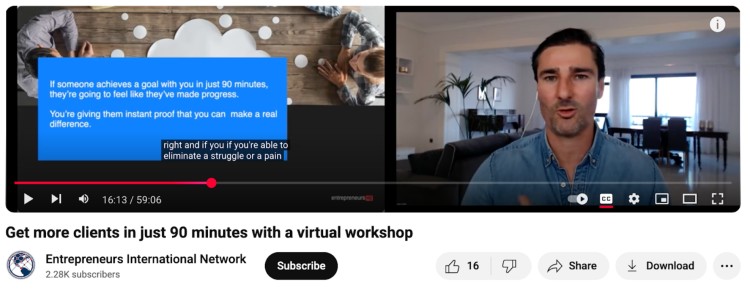
Title: [Insert your episode title here]
Welcome: Welcome to [Podcast Name], where we help [insert what your podcast helps with]. I’m your host, [Name]. Today I’m joined by [Guest Name], [one-sentence intro: who they are and what they do].
Hook: If you’re [audience pain point], you’ll love today’s episode. We’re talking about [main topic] and [why it matters to your listeners].
Intro:
[Guest Name] helps [ideal client or niche] do [result]. Today, they’re sharing their top tips on [episode topic]. Some of it might surprise you.
[Segment 1] Guest intro:
- Can you tell us a bit about your background and how you got started in [field]?
- What inspired you to focus on [niche or result]?
[Segment 2] Core topic questions:
- What’s one big misconception people have about [topic]?
- What’s a mistake you see often, and how can people avoid it?
- Can you walk us through your approach or method?
- Any real-world success stories you can share?
[Segment 3] Quick wins and takeaways:
- If someone listening wants to take action today, what’s the first step?
- Any resources, tools, or practices you recommend?
Outro: Thank you so much, [Guest Name], for sharing your insights.
[Optional Guest Quote or Final Thought]
Listeners, I hope this gave you practical ideas you can actually use.
CTA: Want to connect with [Guest Name]? Check the show notes for links to their website and socials. And if you loved this episode, hit follow and share it with someone who needs it.
5 Common Mistakes in Podcast Scripting To Avoid
Here’s where most beginners trip up and how to dodge those early missteps:
- Writing a novel. Don’t write out every single word and try to read it like a robot. You’ll lose your natural tone. Instead, use prompts or short sentences to keep things sounding real.
- Skipping the hook. Your intro matters. If you don’t catch your listener’s attention in the first 30 seconds, they’ll bounce. Give them a reason to stick around.
- Forgetting your call to action. Want them to visit your site? Sign up for a lead magnet? Book a discovery call? Say it clearly. Don’t assume they’ll just “get it.”
- Trying to be someone else. Don’t copy someone else’s script word-for-word. Your style is your edge. Be conversational. Be you.
- Winging it and regretting it. Some people think scripts are “too structured” then realize they forgot half the points they meant to make. A simple outline would’ve fixed that.
Podcast Script Generator
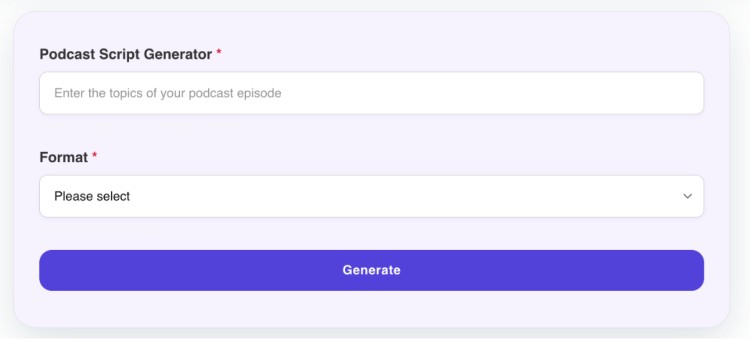
Want to knock out a clean podcast script in under 10 minutes? Use the Talks podcast script generator. It gives you the structure, you bring the voice.
All it asks is two things:
- What’s your episode about?
- What’s the format? (Solo, co-hosted, or guest interview)
Once you enter that, it gives you a full episode layout you can work from: intro, main talking points, transitions, wrap-up. All done for you.
Perfect if you’ve got ideas but don’t want to mess around figuring out where to start.
Try the free Talks podcast script generator and have your next episode mapped out in minutes.
Need help with your show’s name or episode title too? Try the podcast name generator or the podcast title generator. They’re built to spark ideas fast.
Try any of these free Talks podcast generator tools and have your next episode mapped out in minutes.
Scripts That Stick
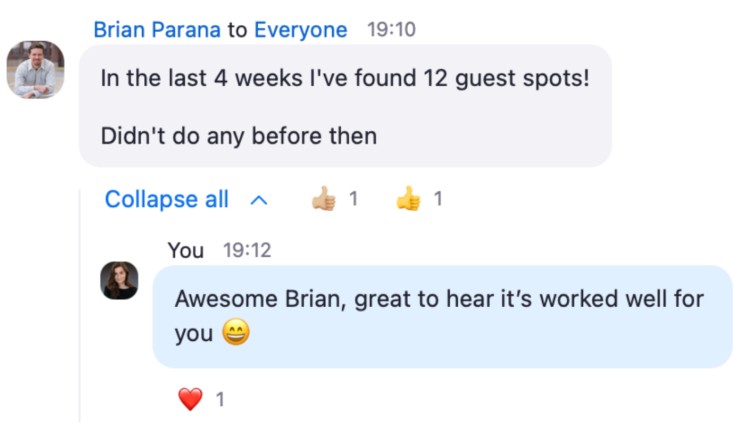
Now that you know how to start a podcast script, you’re already ahead of most. A clear script gives you more confidence, better flow, and a smoother experience for your listeners.
But here’s the thing: great content is just one part of growing your podcast. If you want more visibility, better connections, and opportunities that actually lead somewhere, it helps to get in front of the right people.
That’s exactly what Talks is for.
It’s where podcasters and guests find each other without the awkward cold pitches or hours of searching.
Want to get featured on more podcasts without doing all the outreach yourself?
Create your free Talks Creator profile and let hosts find you.
